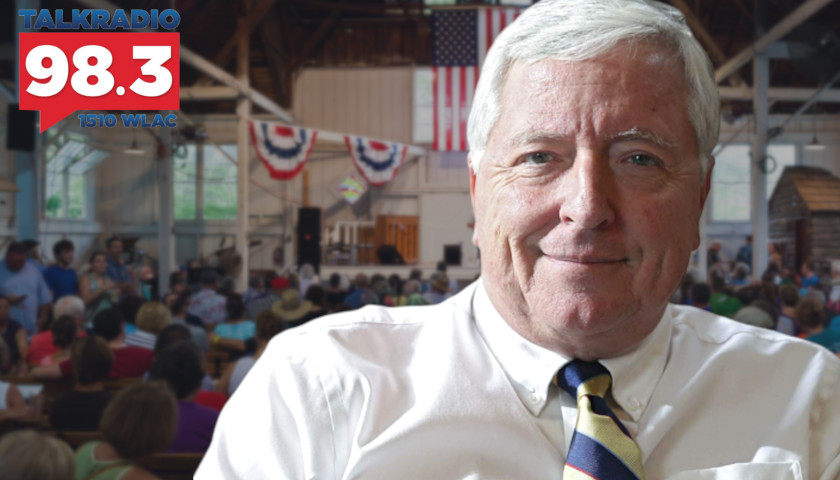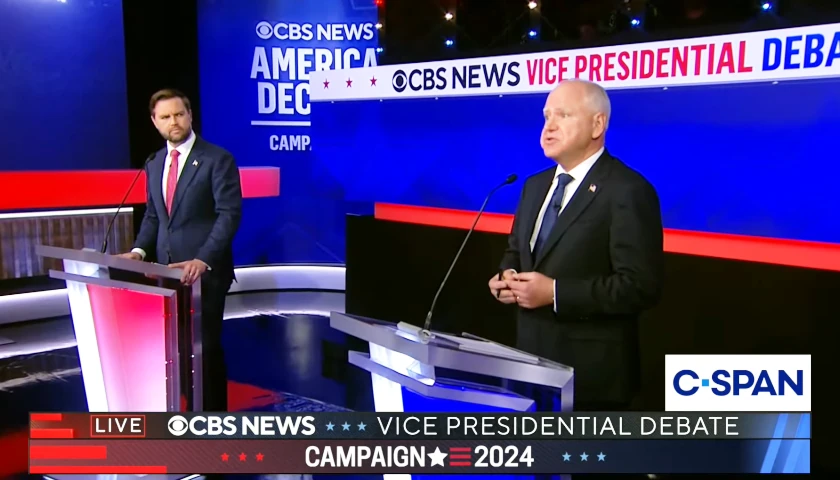On Tuesday’s Tennessee Star Report with Michael Patrick Leahy – broadcast on Nashville’s Talk Radio 98.3 and 1510 WLAC weekdays from 5:00 a.m. to 8:00 a.m. – Leahy was joined live on the newsmakers line by longtime friend and ambassador to the Iowa Democratic presidential field, Jim Larew.
During the second hour, Larew discussed his recent commentary and described the current positioning of the top four Democratic presidential candidates Biden, Sanders, Buttigieg, and Warren. He noted that Warren was waning in her support due to her inability to properly address questions about her Medicare plans. Larew added that although Warren and Sanders share similar constituent characteristics, Sanders projected more energy and charisma which is influencing his lead.
Leahy: And we are joined now by our very good friend, Jim Larew calling from Iowa. Jim, welcome to the Tennessee Star Report.
Larew: Thanks so much and good morning.
Leahy: Well, we had a terrific commentary today by a guy by the name of Jim Larew making the Iowa caucuses what they are not. We got permission from you and from the Democrat blog up there called Bleeding Heartland where this was first published.
You gave us a revised version of it. (Chuckles) What I found interesting about this was that I didn’t know that Julian Castro was blaming the Iowa caucuses for his poor presidential performance.
Larew: Well, he withdrew giving the caucuses a kick on the way out the door which is his right. And there was a perennial concern as to whether or not Iowa should be first and whether it’s demographically representative enough.
Both parties weighed their concerns and had been for 15 years anyway settling that well, Iowa is as good as any place to start because of other factors. He points out that compared to the nation and his own state of Texas that the demographics are different here. It’s a pretty good ploy politically.
Particularly for a candidate who is struggling to kick the system because the press goes out of its way. I think both sides ideologically from the left to the right and even mainstream and want to be fair. So if someone is saying a contrary position they try to make it known. Not since ’88 when Al Gore was out here and his own campaign was thinking. (Leahy laughs)
And so he made his campaign to be against the caucuses and it looks very brave. In Iowa, we’re pretty polite here. And to sort of in your face say we don’t like the system you have. Everyone covers it. And so he did that and got a lot of press. But then he’s now gone. I think it will be an issue as it always is after the election.
Maybe it will change after here. The point of my piece was that there are some factors about Iowa that make it not a bad place to start. But what I like about Iowa in the system in addition to being an Iowan of course, is that there really is about as level a playing field as you could have to start the process. And it’s not one where people can just flood the media and get traction.
It takes eyeball to eyeball and toe to toe kind of campaigning. These people practice their pitches. Whoever comes out of Iowa will have a year behind them meeting eyeballs in the audience knowing what works and what doesn’t. That’s not so much important once you get in front of TV cameras down the road.
Which is really where the campaign goes. It’s pretty much media after Iowa, South Carolina, New Hampshire, and Nevada. But it’s just one state after the other and the media campaigns and the paid commercials pretty well take over from there.
Leahy: Now, your commentary which showed up as our lead commentary in all of our titles actually is getting some traction.
Larew: I’m very flattered that you would do that.
Leahy: Well, what’s interesting to me that it was first published at Bleeding Heartland which is sort of a Democrat left-leaning blog. I met, what’s the name of the woman that runs it?
Larew: Laura Belin. Very articulate.
Leahy: Very nice. Very left. Would not align with our listeners here at the Tennessee Star Report. But what I found amusing. And you and I are friends from many years ago and roommates in Washington, D.C. one summer more than 40 years ago. I would say that I’m very conservative and you are progressive would be good way to describe you and your politics?
Larew: I would say that I’m a non-apologetic 60’s liberal. I don’t know what that means in today’s world . That’s who I was and that’s who I am.
Leahy: But what’s interesting is that you got some push back at the Bleeding Heartland to your commentary here. They called you some bad names some of the commentors? They usually call me those names Jim. (Laughs)
Larew: We seem to have epitaphs that we’re using now if we just want to put a person down you know? I was told that this was, I was trying to be analytical and sort of institutional in the piece, and yet I’ve been called a spokesman for white male privilege (Leahy laughs) and different things that I don’t know exactly how to answer it. I’ve been called a terribly insensitive man and the rest of it. But so be it.
Leahy: Here’s what’s funny about that. Those are the kinds of things that the left has said about me for years and years and years. It’s just so funny because you are the least likely person to have those things said about them. It’s kind of funny.
Larew: It’s a word that people use when they’re down in the trenches when they’re going head to head.
(Commercial break)
Leahy: Jim, it’s four weeks to the day until the caucuses. What happens in the last four weeks? What’s the horse race looking like?
Larew: Well, it sure looks like the top contenders and maybe in this order. Buttigieg, Sanders, Biden, and then Elizabeth Warren appears to be waning somewhat. Whereas Senator Klobuchar appears to be gaining a little bit. But she’s way down in that order. And the organizations of each are differing and strange.
Buttigieg has a pretty amazing and well-organized campaign. Sanders, very popular and charismatic. Lots of intensity. Biden, popular but the intensity is not there to the same degree. And yet the present moment seems to gravitate in his favor. That is with the new developments in Iran and Iraq.
I think the foreign policy experience in one’s resume is going to matter a lot more in the coming weeks between now and February third. Mike, you and I have talked over the course of the last few months when you were out here early in November.
It sure feels here like the Iowa caucus will be determined less on specific issue positions like, what exactly polls Medicare for all or not. Although that’s important. It just seems to me this year, and that’s not always true, normative kinds of things like who feels most authentic. Most compassionate? Where is the experience or the wisdom or the judgment?
Who does the public trust most? And then real importantly, which of the candidates do Iowa Democrats feel could beat Mr. Trump if that person were nominated? Those kinds of factors many of them on the whole favor Biden. And he might be energized towards the end of his candidacy by those kinds of issues.
And he really is not as well organized as the others. So right now I think it’s a jump ball. I don’t think we can predict with certainty who will win it. But I think the front runner status of Biden, Sanders, and Buttigieg with Warren now a couple of steps behind is likely what’s going to happen.
And it’s probably all that needs to happen for these candidates to survive Iowa and move on. I don’t think Iowa should be picking the winner as much as we should be probably whittling from the winner. And moving from the 24 candidates we had not too long ago which is way too many.
Leahy: Why is Elizabeth Warren losing momentum in Iowa?
Larew: I think for her it was the Medicare for all issue that she appeared to stumble when asked to give the particulars. And when she did and it was promising that the whole system would be changed almost overnight and for a lot of her followers she and Bernie appear similarly. But I think they have different constituencies.
You can feel it in the crowds when you go and watch the faces. With Bernie’s group, Medicare for all I think feels like a step forward. And an assurance of a piece of the common wheel that poor people or people on the edge of the economy who don’t feel assured of. Elizabeth Warren is more of the tweed jacket and pipe smoking crowd to exaggerate it. These are people who probably have more access to health insurance already. And her proposal feels like she would be skipping something.
Leahy: Taking something away.
Listen to the full second hour:
– – –
Tune in weekdays from 5:00 – 8:00 am to the Tennessee Star Report with Michael Patrick Leahy on Talk Radio 98.3 FM WLAC 1510. Listen online at iHeart Radio.





